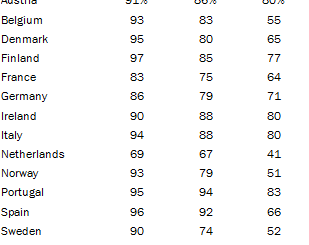
Most people I talk to seem to agree that forcing religion on others, whether children or adults, is not a good thing. The problem is that people do not necessarily agree on what constitutes forcing religion on people, vs. genuine teaching or sharing of one's faith or religious beliefs. This article focuses on the line between positive sharing or teaching, and coercion or forcing one's belief on others. It particularly focuses on children, but many of the same concepts often apply to adults as well.
This page represents my own personal opinions or beliefs, but I try to keep it more general, without referring to one specific religion or denomination. I hope the advice here can be useful to people from a wide variety of different religious backgrounds.
How are beliefs being presented?
I personally think there is a huge difference between presenting religious beliefs as "This is what I believe." vs. "This is what is globally / universally true." An example would be saying: "This scripture means X." or "God wants you to do X." I find these statements to come across as forcing your own views on others.
If, on the other hand, you say things like: "I interpret this scripture to mean X." or even "In this community, people usually interpret this scripture to mean X." It comes across as less forceful. It presents a more global truth – not claiming that everyone believes something, but instead admitting that it's either one person's opinion, or perhaps the perspective or collective belief of people in a certain community.
I find this is very helpful for teaching children healthy boundaries about their own religious community's beliefs: instead of just presenting a belief as true, it sends a message like: "This is what we believe, but not everyone out there believes this." I find this not only is more respectful to the kids receiving the message, but it will help them to be more respectful when they come into contact with people from other religions later.
Are you sheltering your child or controlling their access to information about other beliefs?
It makes sense that parents would want to raise their children in such a way that exposes them to and instills the values that the parents see as most important to them in life. But there's a difference between presenting information, and trying to keep your children from being exposed to any conflicting information.
Attempts to control information can often backfire, and in more ways than one. Children can and do rebel against their parents, often when they are teenagers, but sometimes younger or later in life. When they are exposed to new information and realize that their access to information was controlled and that they were kept highly sheltered at an early age, they can feel betrayed.
Even when the children are not overtly rebellious and do not overtly reject what is taught to them, sheltering them can make them vulnerable to things in the outside world. Some ideas or beliefs out there can be harmful or dangerous, and if children are not given some sort of exposure to harmful or untruthful ideas, it is possible that they will not have much of a way to protect themselves against them.
Not requiring children to participate in religion without their consent:
Especially as children become older, it becomes important to obtain their consent, and not force them to participate in religious ceremonies or schooling. If a child does not object, there is nothing wrong with sending them to a religious school, or taking them with you to church or to any other religious community or gathering on a regular basis.
But if your child speaks up and says that they are uncomfortable with what they are being taught, or do not want to attend or participate in a religious ceremony, tradition, or community, it is important to listen to them, and respect their wishes.
If you force your child to attend religious services or schooling against your wishes, it is my belief that you are forcing your religion on them. Not only do I personally think this is wrong, but I think it is likely to backfire, alienating them from your religion and possibly creating a rift in your relationship with them as well.
In summary:
Not everyone agrees about where to draw the line between legitimate religious schooling or the passing down of traditions from one generation to the next, and forcing your religion onto your children. I personally believe that some of the key aspects of this distinction are not requiring the child to participate in religion against their will , not controlling your child's access to information , and not presenting your own personal beliefs or the beliefs of your religious community as if they were the only thing that people believed .
If you obtain your child's consent for the ways in which they participate in religion, and if you allow your child to learn about different beliefs and viewpoints, and if you present your own beliefs as what they are – your beliefs, rather than a truth that everyone believes – then I think you are sharing your religion in a way that is much healthier for your child.
Proudly WWW.PONIREVO.COM
Source by Alex Zorach



